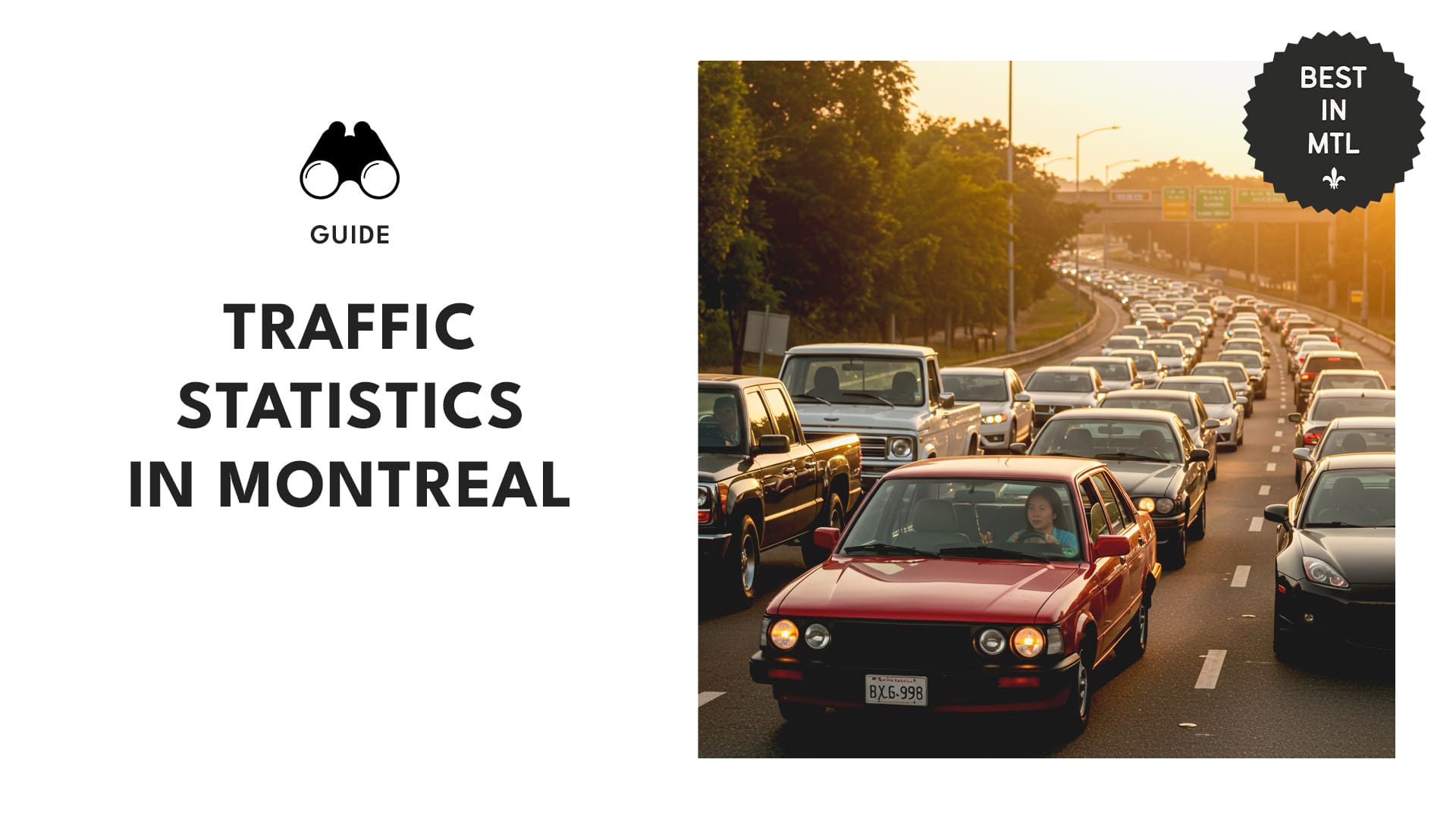Breaking down traffic statistics in Montreal: What the numbers reveal
Key insights
| According to the 2024 INRIX Global Traffic Scorecard, Montreal ranked 32nd globally in traffic congestion. Commuters lose 58 hours in delays per year because of this. Concordia University states that freight traffic from the Port of Montreal significantly contributes to congestion, with over 2,000 truck trips per day. Montreal loses an estimated $45 million in work hours and $4 billion in delivery delays and productivity losses per year, according to Global News. The City of Montreal has partnered with Kapsch TrafficCom to use an AI-powered traffic monitoring system in 19 intersections to improve infrastructure planning and reduce congestion. The City of Montreal has a Climate Plan 2020-2030 that aims to decarbonise transportation and cut road transportation emissions by 50% by 2040. |
Traffic congestion in Montreal costs the city millions of dollars and countless hours every year. Congestion is influenced by various factors, including freight traffic, roadworks, and limited public transportation coverage.
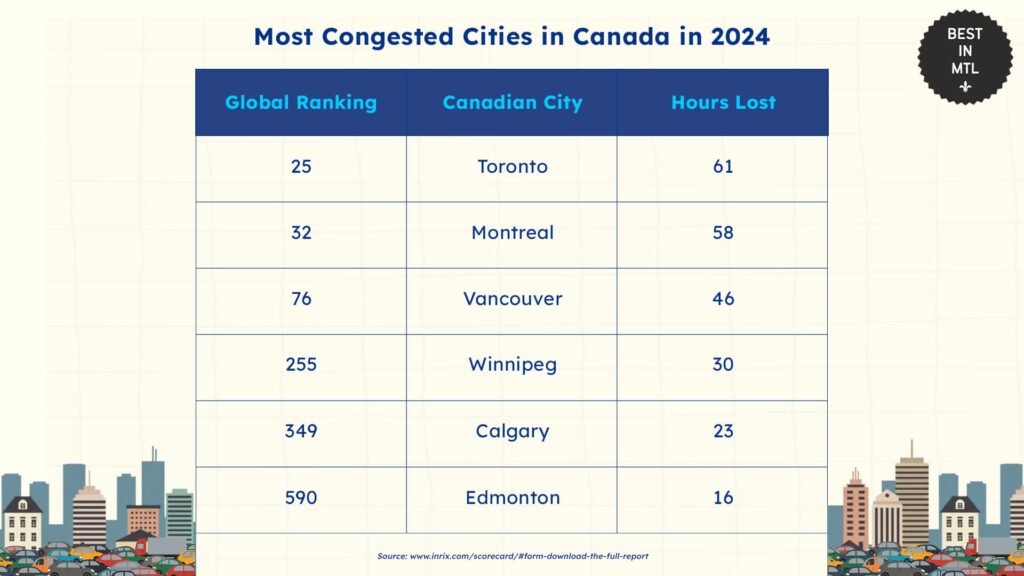
According to the 2024 Global Traffic Scorecard by INRIX, Montreal ranked 32nd in terms of traffic congestion, with commuters losing an average of 58 hours per year in traffic delays.
The data marks a 2% increase from last year’s record.
Other major Canadian cities ranked in the top 100 as well. Toronto placed 25th with 61 hours lost per year. Meanwhile, Vancouver is at 76th place with 46 hours lost annually.
Traffic congestion in Montreal and its causes
According to Concordia University, a lesser-known cause of traffic congestion in Montreal is freight traffic from the Port of Montreal.
The port handles over 39 million tonnes of cargo annually and generates over 2,000 truck trips per day. This causes significant traffic on the road as trips are constantly made daily.
Apart from this, Financial Express also listed several common factors contributing to congestion as seen in the illustration below.
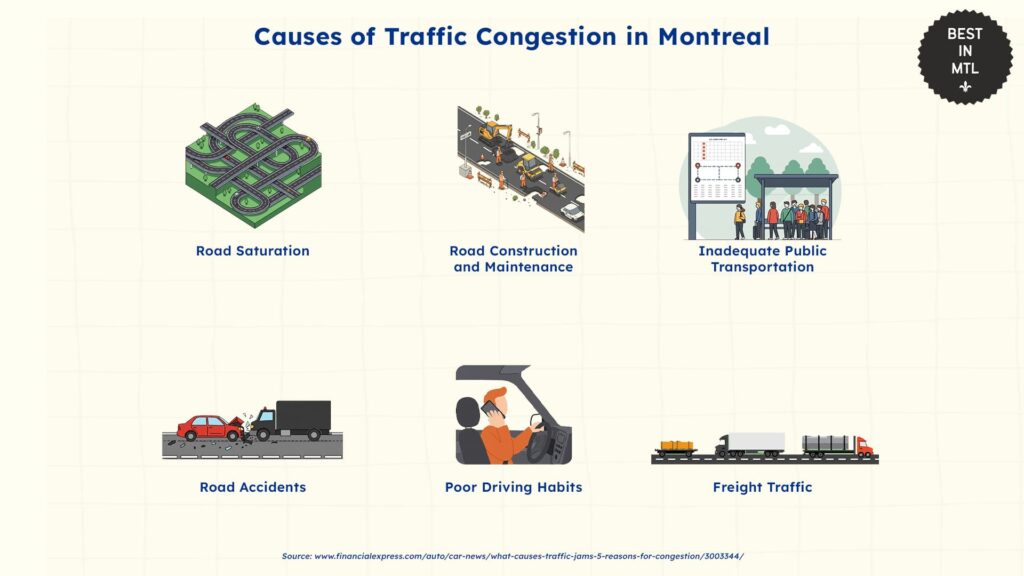
- Road saturation: Occurs when the number of vehicles on the road exceeds the capacity of the infrastructure. This leads to heavy traffic, especially during peak hours.
- Road construction and maintenance: Major infrastructure projects such as highway expansion, road repairs, and bridge renovations, often result in lane closures or detours. These often lead to bottlenecks and obstacles that further slow down traffic.
- Inadequate public transportation: Public transit options may not cover all areas or handle a large influx of passengers. This leads people to opt for their cars, leading to more vehicles on the road.
- Road accidents: Collisions, vehicle breakdowns, and stalled vehicles on major roads can cause sudden and severe traffic jams. Emergency response vehicles can also add to the blockages.
- Poor driving habits: Reckless driving, sudden lane changes, tailgating, and distracted driving often lead to accidents or unnecessary slowdowns. Double parking and failure to follow traffic signals are also factors.
Impact of traffic congestion on Montreal’s economy
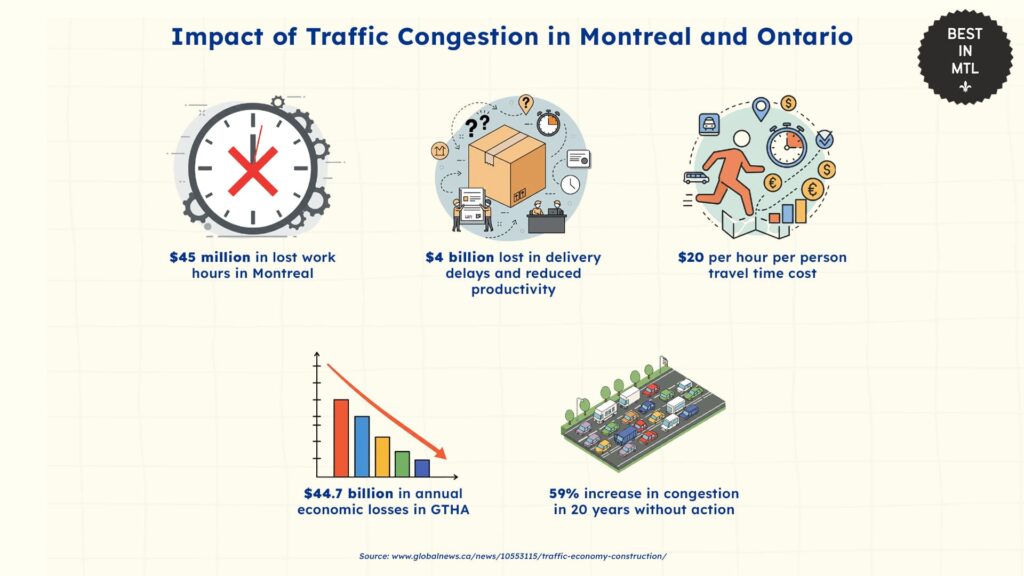
According to a 2021 report by the Canadian Automobile Association (CAA), courtesy of Global News, Montreal lost approximately $45 million in work hours due to congestion.
The overall cost of delivery delays and reduced productivity reached an estimated $4 billion that year.
In line with lost productivity, workers impact business performance as they spend more time in traffic. Geotab ITS estimates that the cost of travel time due to congestion is valued at around $20 per hour per person.
Montreal faces severe economic losses due to heavy traffic gridlocks, which can also be seen in Ontario’s Greater Toronto and Hamilton Area (GTHA). According to the Financial Post, the congestion costs the economy around $44.7 billion annually.
The Impact of Congestion in the GTHA and Ontario: Economic and Social Risks study reported by the Financial Post predicted that congestion could increase by 59% in the next 20 years without proper action, resulting in economic losses reaching $56.4 billion.
This emphasises the growing need for increased infrastructure investment. Similarly, Montreal will face economic consequences if the infrastructure is not prioritised.
Montreal’s traffic management and solutions
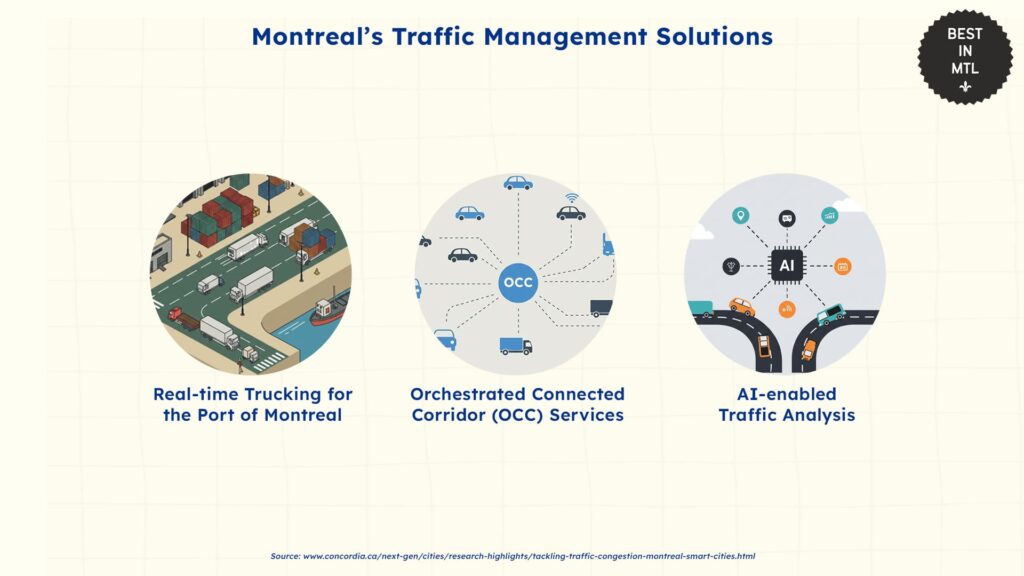
According to Anjali Awatashi, a professor at Concordia University, congestion will only worsen as urban populations increase.
Awatashi highlights that expanding and improving public transportation is one of the most effective ways to reduce congestion. This involves introducing options such as rideshare programs and park-and-ride facilities.
Freight traffic and port congestion in Montreal
As established from the same report by Concordia University, the Port of Montreal is also a contributor to Montreal’s traffic congestion. To combat this, the Port of Montreal has introduced a trucking portal that provides real-time updates on truck turnaround times.
Additionally, the port extends its gate hours from 6:00 AM to 11:00 PM. This allowed for more flexible scheduling and reduced peak-hour traffic.
Smart real-time traffic monitoring in Montreal
As per IOT World Today, the City of Montreal and Kapsch TrafficCom are working on providing real-time traffic insights using advanced technologies to monitor traffic patterns and reduce accidents.
Through the deployment of Orchestrated Connected Corridor (OCC) services, the city hopes to improve infrastructure planning based on data gathered from video cameras and connected vehicles.
The system will collect and analyse data from 19 intersections in Downtown Montreal. This AI-driven technology can detect incidents like wrong-way driving, pedestrian crossings, and congestion buildups.
AI-powered traffic flow management in Montreal
Another AI solution, developed by Fujitsu’s Computer Vision Solution Center, uses real-time traffic data collection from sensors and CCTV cameras.
In partnership with Fujitsu, this initiative involves analysing traffic patterns from 2,500 traffic lights across the city using AI-enabled data analysis.
The AI algorithms analyse traffic flow and predict congestion for the following 15 minutes. Based on these predictors, traffic light synchronisation can be automatically adjusted to reduce congestion.
Alternative transportation and reducing congestion in Montreal
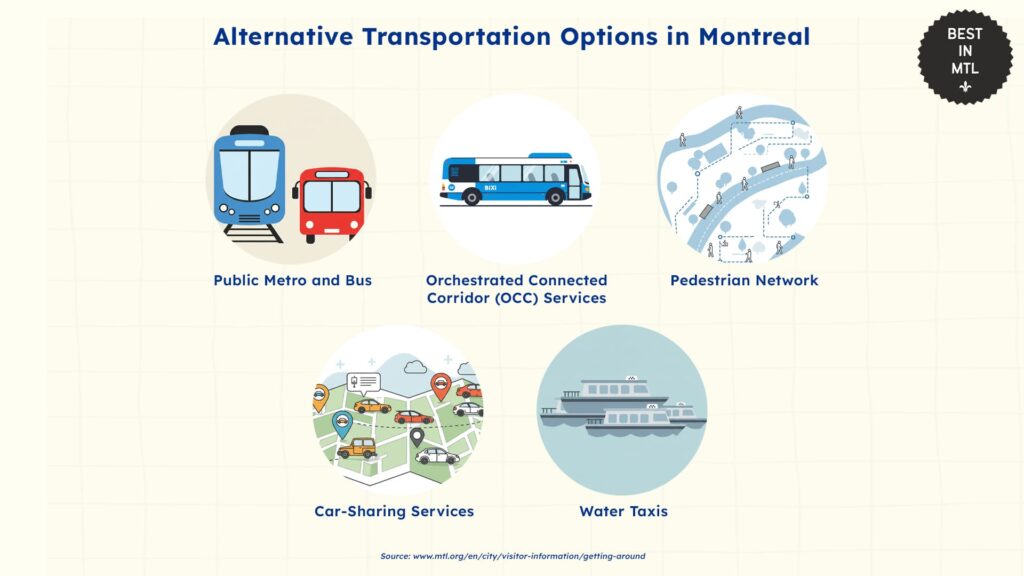
According to Tourisme Montreal, the city offers a variety of alternative transportation options that help reduce traffic congestion. Key options include:
- Public Metro and bus: Operated by the Société de transport de Montréal (STM), the city’s metro is a reliable transportation option. It consists of four metro lines connecting downtown to major tourist sites.
- BIXI public bike system: Montreal has an extensive 780-kilometre network of bike paths. This offers a more affordable and convenient way to travel short distances.
- Pedestrian network: Walking is a popular mode of transportation, particularly in dense areas like the Old Port, Chinatown, and Plateau-Mont-Royal. The city also has an underground pedestrian network spanning 33 kilometres.
- Car-sharing services: Popular car share services like Communauto are great for vehicle sharing. Taxis are also widely available.
- Water taxis: Water taxis operate along the St. Lawrence River, connecting to locations like Parc Kean-Drapeau and Longueuil.
Montreal’s environmental traffic goals
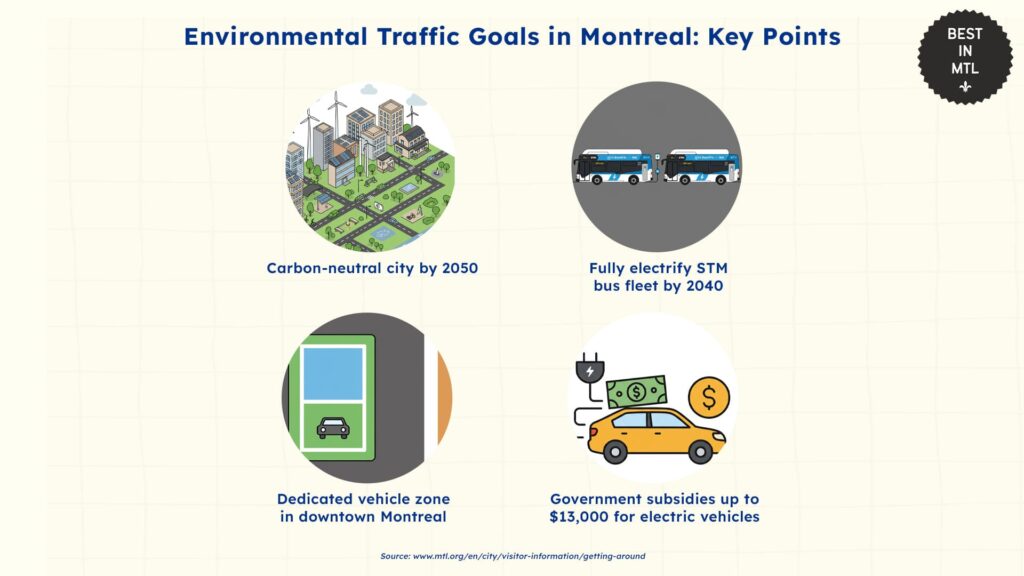
According to the City of Montreal, the city has set a goal to become a carbon-neutral city by 2050, with a significant focus on reducing greenhouse gas (GHG) emissions from road transportation.
Currently, road transportation accounts for about 43% of the city’s total emissions.
As part of its long-term strategy, Montreal has implemented the Climate Plan 2020-2030. This focuses on decarbonizing transportation and creating more sustainable infrastructure.
The plan includes fully electrifying the STM bus fleet by 2040. Additionally, the city plans to convert large off-street parking lots into green spaces or urban development projects.
Another key initiative is the creation of a dedicated electric vehicle zone in downtown Montreal. In line with this, residents are encouraged to transition to electric vehicles, with government subsidies offering up to $13,000 in financial assistance.
References
- City of Montreal. Favouring sustainable mobility in Montréal (2023). https://montreal.ca/en/articles/favouring-sustainable-mobility-montreal
- Concordia University. Tackling traffic congestion: How Montreal is using a smart cities approach to improve transportation (n.d.). https://www.concordia.ca/next-gen/cities/research-highlights/tackling-traffic-congestion-montreal-smart-cities.html
- Financial Express. What causes traffic jams: 5 reasons for congestion (2023). https://www.financialexpress.com/auto/car-news/what-causes-traffic-jams-5-reasons-for-congestion/3003344/
- Financial Post. Report: Congestion Threatens Economic Stability and Quality of Life (2024). https://financialpost.com/globe-newswire/report-congestion-threatens-economic-stability-and-quality-of-life
- Fujitsu. City of Montreal Smoothing traffic flows with AI analysis Case Study (n.d.).https://global.fujitsu/en-apac/customer-stories/cs-city-of-montreal-20210701
- Geotab Inc. and Geotab ITS. Gardiner Traffic Slowdowns Are Impacting Business Productivity, Geotab ITS Analysis Reveals (2024). https://www.newswire.ca/news-releases/gardiner-traffic-slowdowns-are-impacting-business-productivity-geotab-its-analysis-reveals-826080915.html
- Global News. How do traffic slowdowns and congestion affect the economy? (2024). https://globalnews.ca/news/10553115/traffic-economy-construction/
- INRIX. INRIX 2024 Global Traffic Scorecard (2024). https://inrix.com/scorecard/#city-ranking-list
- IOT World Today. Smart Traffic Management Project Launches in Montreal (2023). https://www.iotworldtoday.com/smart-cities/smart-traffic-management-project-launches-in-montreal
- Tourism Montreal. Getting around (n.d.). https://www.mtl.org/en/city/visitor-information/getting-around







